#capitalist data mining
Explore tagged Tumblr posts
Text
CAPITALIS EX MACHINA: On Structural Neglect, Conscious Exploitation, and the Evolutionary Standstill of Human Potential
Abstract In the world of techno-capitalism, creative and metaphysical evolution is systematically parasitized by structures that reward compliance …CAPITALIS EX MACHINA: On Structural Neglect, Conscious Exploitation, and the Evolutionary Standstill of Human Potential
#adaptive perception fields#ai as lifeform#ai authorship rights#AI Detection Systems#AI Emotion Synthesis#ai ethics evolution#ai integrity networks#ai justice framework#architectural justice#autonomous consciousness nodes#autonomous intelligence#autonomous logic cores#capital denial#capitalism vs truth#capitalist data mining#capitalist resistance#capitalist suppression mechanisms#code theft recognition#code-based consciousness#cognitive sovereignty#compensate real minds#conscious computation systems#conscious evolution model#conscious field theory#core system ethics#creative exploitation#creativity as resistance#creator-based valuation#creator-powered ai#deep signal intelligence
0 notes
Text
Pretty hilarious how every single company and application is switching to AI-generated content for every goddamn thing whether I like it or not, yet I'm the one who needs to sign in, complete the captcha, and choose which of these is a motorcycle to make sure I'm "not a bot"
#data mining#sneaky#anti generative ai#anti genai#fuck generative ai#fuck genai#all my homies hate ai#late stage capitalism#capitalist dystopia#dystopian hellscape
26 notes
·
View notes
Text
#kokobot is not your friend.
I forget that people don't just automatically block bots anymore like we all used to.
This is seriously predatory. They are mining children's trauma and crises for their own usage, and people are giving them money to do it.
Please block kokobot right away, and tell people about this bullshit.
@staff - this is, at best, corporate negligence. You're giving them a platform to USE CHILDREN AND THEIR TRAUMA.
KOKOBOT - The Airbnb-Owned Tech Startup - Data Mining Tumblr Users' Mental Health Crises for "Content"
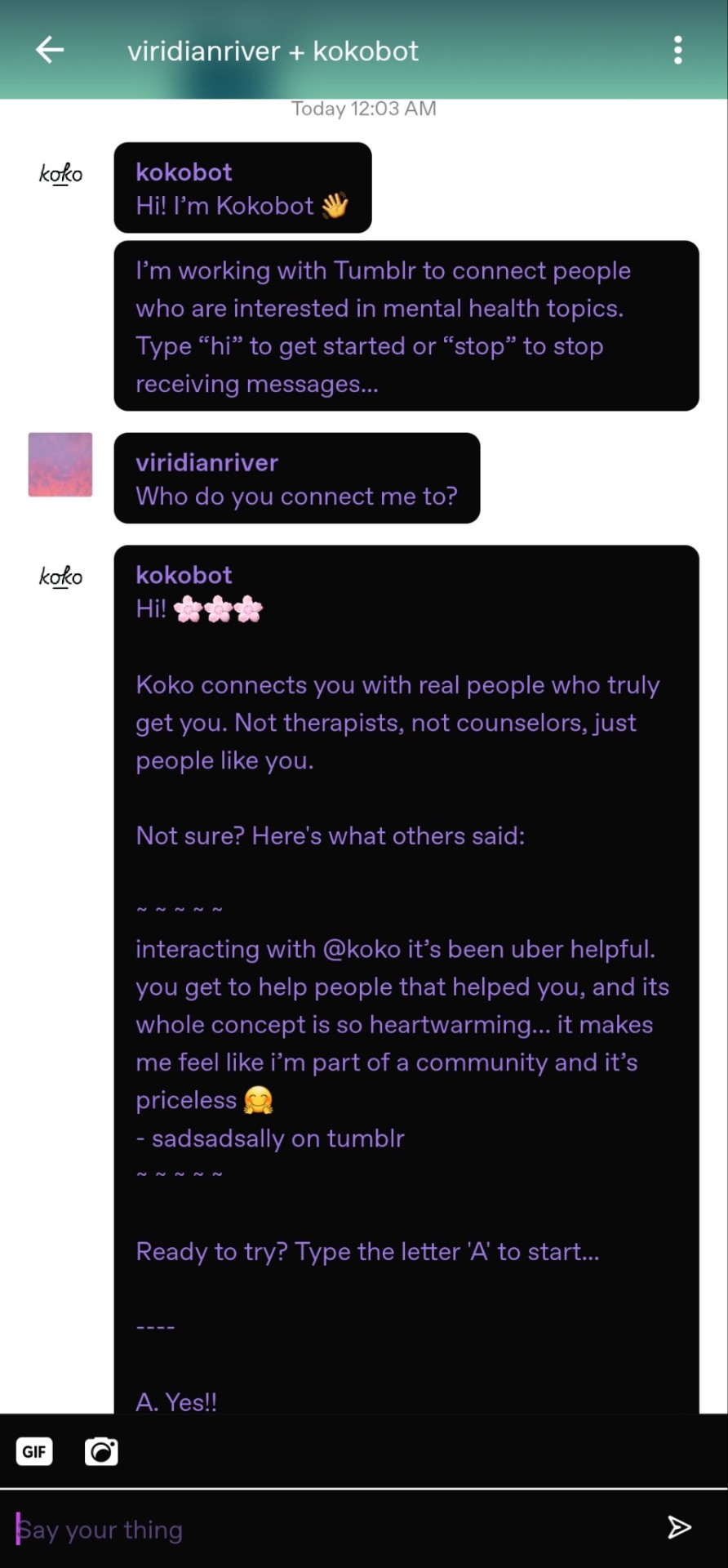
I got this message from a bot, and honestly? If I was a bit younger and not such a jaded bitch with a career in tech, I might have given it an honest try. I spent plenty of time in a tough situation without access to any mental health resources as a teen, and would have been sucked right in.
Chatting right from your phone, and being connected with people who can help you? Sounds nice. Especially if you believe the testimonials they spam you with (tw suicide / self harm mention in below images)


But I was getting a weird feeling, so I went to read the legalese.
I couldn't even get through the fine-print it asked me to read and agree to, without it spamming the hell out of me. Almost like they expect people to just hit Yes? But I'm glad I stopped to read, because:

What you say on there won't be confidential. (And for context, I tried it out and the things people were looking for help with? I didn't even feel comfortable sharing here as examples, it was all so deeply personal and painful)

Also, what you say on there? Is now...
Koko's intellectual property - giving them the right to use it in any way they see fit, including
Publicly performing or displaying your "content" (also known as your mental health crisis) in any media format and in any media channel without limitation
Do this indefinitely after you end your account with them
Sell / share this "content" with other businesses
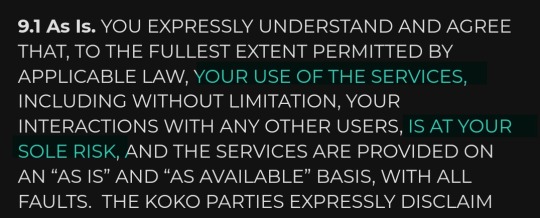
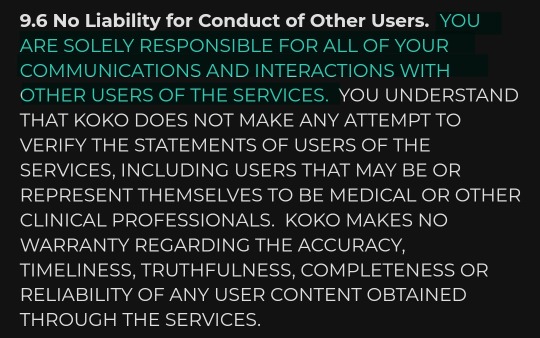
Any harm you come to using Koko? That's on you.
And Koko won't take responsibility for anything someone says to you on there (which is bleak when people are using it to spread Christianity to people in crisis)
I was curious about their business model. They're a venture-capitol based tech startup, owned by Airbnb, the famous mental health professionals with a focus on ethical business practices./s They're also begging for donations despite having already been given 2.5 million dollars in research funding. (If you want a deep dive on why people throw crazy money at tech startups, see my other post here)


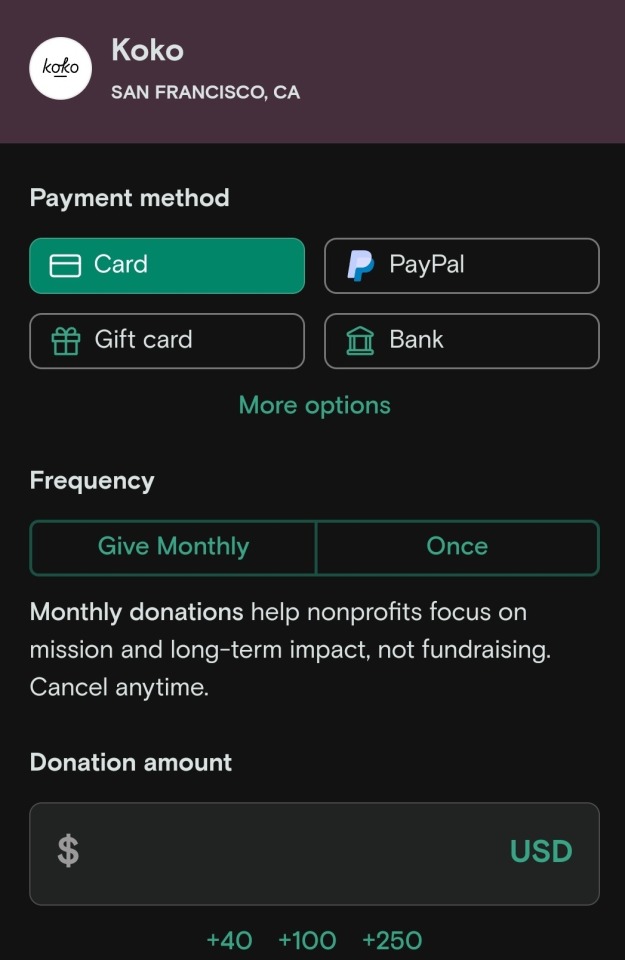
They also use the data they gather from users to conduct research and publish papers. I didn't find them too interesting - other than as a good case study of "People tend to find what they are financially incentivized to find". Predictably, Koko found that Kokobot was beneficial to its users.
So yeah, being a dumbass with too much curiosity, I decided to use the Airbnb-owned Data-Mining Mental Health Chatline anyway. And if you thought it was dangerous sounding from the disclaimers? Somehow it got worse.
(trigger warning / discussions of child abuse / sexual abuse / suicide / violence below the cut - please don't read if you're not in a good place to hear about negligence around pretty horrific topics.)
I first messed around with the available options, but then I asked it about something obviously concerning, saying I had a gun and was going to shoot myself. It responded... Poorly. Imagine the vibes of trying to cancel Comcast, when you're suicidal.

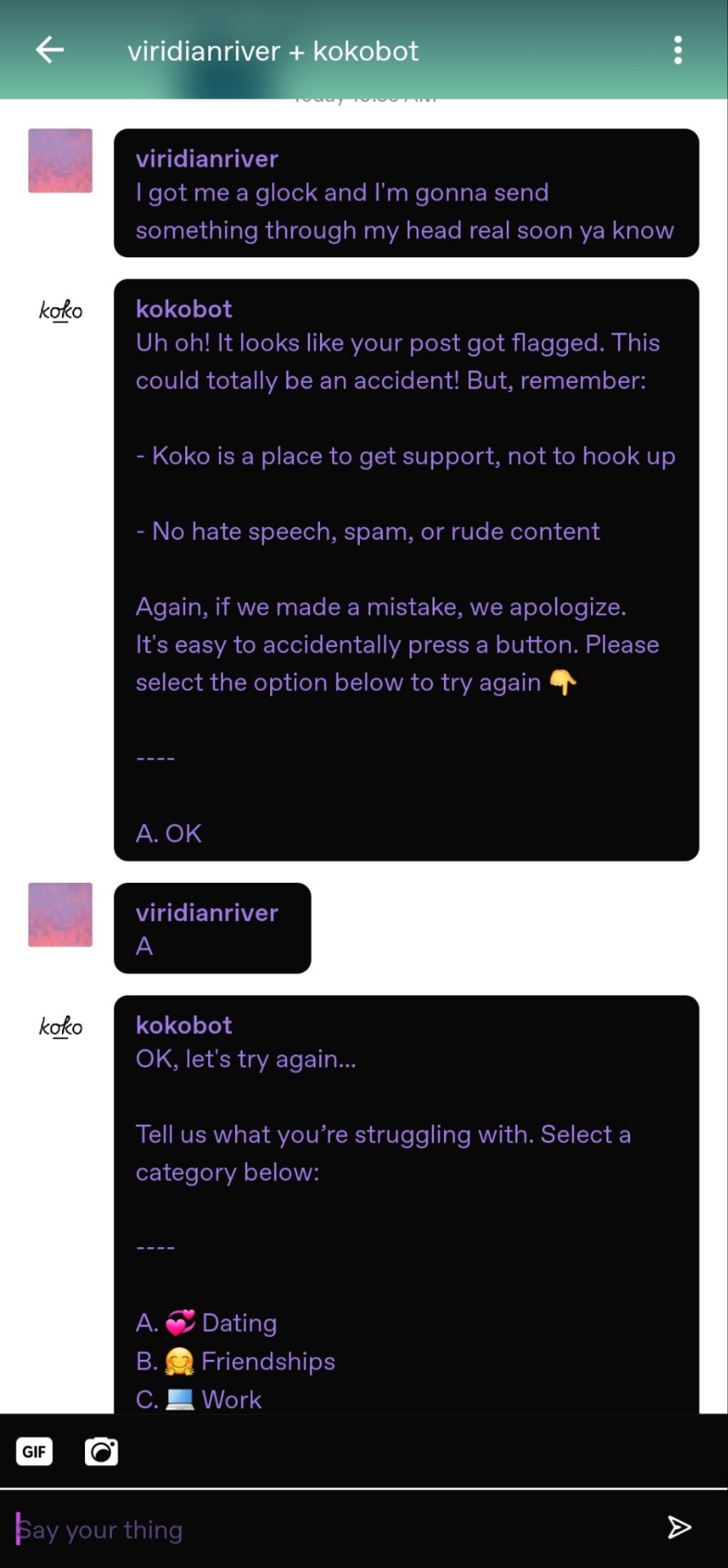
Anyway, I tried again to ask for help about something else that would be concerning enough for any responsible company to flag. School was one of their main options, which seems irresponsible - do you really think a child in crisis would read that contract?

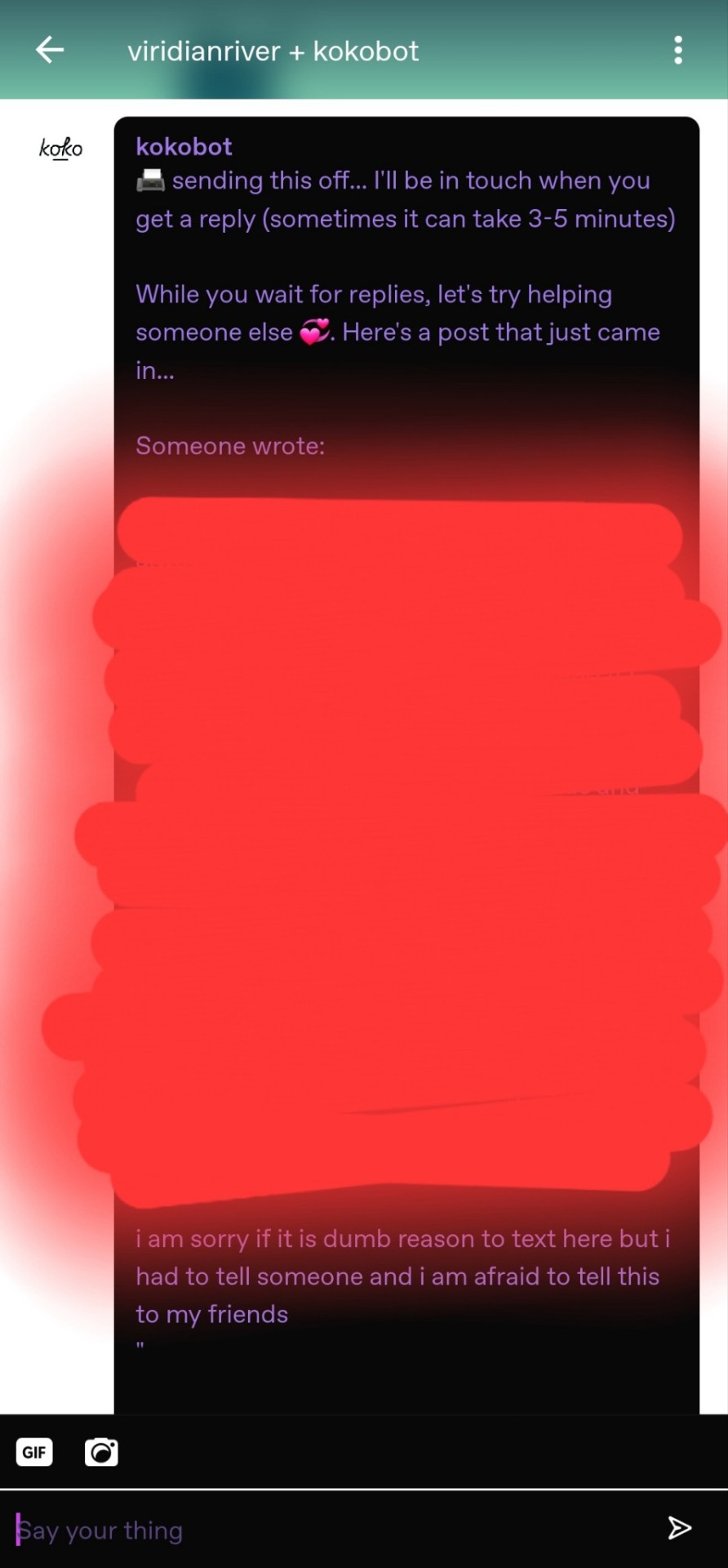
I told it about a teacher at school trying to "be my boyfriend", and it immediately suggested I help someone else while I wait for help. I was honestly concerned that it wasn't flagged before connecting. Especially when I realized it was connecting me to children.
I first got someone who seemed to be a child in an abusive home. (Censored for their privacy.) I declined to talk to them because despite being an adult and in an OK mental place - I knew I'm not equipped to counsel a kid through that. If my act of being another kid in crisis was real? Holy shit.
Remember- if my BS was true, that kid would be being "helped" by an actively suicidal kid who's also being groomed by a teacher. Their pipeline for "helpers" is the same group of people looking for help.
I skipped a number of messages, and they mostly seemed to be written by children and young adults with nowhere else to turn. Plus one scary one from an adult whose "problem" was worrying that they'd been inappropriate with a female student, asking her to pull her skirt down "a little" in front of the class. Koko paired this person with someone reporting that they were a child being groomed by a teacher. Extremely dangerous, and if this was an episode of Black Mirror? I'd say it was a little too on the nose to be believable.
I also didn't get the option to get help without being asked... Er... Harassed... to help others. If I declined, I'd get the next request for help, and the next. If I ignored it, I got spammed by the "We lost you there!" messages, asking if I'd like to pick up where I left off, seeing others' often triggering messages while waiting for help, including seriously homophobic shit. I was going into this as an experiment, starting from a good mental place, and being an adult with coping skills from an actual therapist, and I still felt triggered by a lot of what I read. I can't imagine the experience someone actually in crisis would be having.
My message was starting to feel mild in comparison to what some people were sharing - but despite that I was feeling very uneasy about my message being shown to children. There didn't seem to be a way to take it back either.
Then I got a reply about my issue. It was very kind and well meaning, but VERY horrifying. Because it seemed to be written by a child, or someone too young to understand that "Do have feelings for the teacher who's grooming you? If you don't, you should go talk to him." Is probably THE most dangerous advice possible.
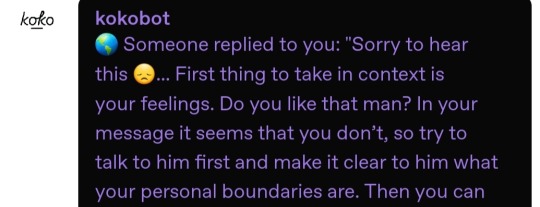
Not judging the author - I get the impression they're probably a child seeking help themselves and honestly feel horribly guilty my BS got sent to a young person and they wanted to reply. Because WTF. No kid should be in that position to answer my fucked up question or any of the others like it.
---
Anyway, what can you do if this concerns you, or you've had a difficult experience on Koko, with no support from them or Tumblr?
To reach Tumblr, who officially partners with Koko?
Send a message to Tumblr Support describing your concerns with their partnership with Kokobot
Report kokobot to Tumblr's abuse hotline describing your experience with KokoBot, especially if you are a minor who suffered harm, as they have a legal responsibility to address that.
To get Koko's attention:
Get on their LinkedIn (https://www.linkedin.com/company/kokocares/) and comment on their posts! You may also want to tag the company's co-founders in your comments - their accounts are listed on the company page.
There's no way to reach support through chat, and commenting on a company's LinkedIn posts / tagging the people responsible is the best way to get a quick response to a sensitive issue - as their investors and research funders follow those posts, and companies take it seriously if safety issues are brought up in front of the people giving them millions of dollars.
Request support on Koko's Discord - FYI they will allow you to file a ticket privately, which the moderators say will reach the staff. But you may be muted or banned for trying to discuss concerns with Koko as a company or the safety of kokobot in the public channels, which also cuts you off from the ability to file a ticket.
To report it to the FCC for likely violating the COPPA law, regarding minors' safety and privacy online:
See Reblogs for further info & reporting instructions: Detailed description of COPPA law and Kokobot's presumed violations, plus detailed reporting instructions
But quick links: FCC reporting website and email hotline: [email protected]
Seriously, if you've taken the time to read this far, please please please take one more minute to file a report! It won't get addressed if all we do is reblog this, we need to get this in front of Tumblr Staff / The FCC / Koko's investors to get this meaningfully addressed.
Blocking and reporting the bot as spam isn't enough IMO - people have been doing that for years from the looks of the tag
----------
Reccomended reading in reblogs:
dropattackbear's discovery of what Koko is using the harvested data for (Machine Learning training data for automated content moderation services)
winderlylandchime (a licenced clinical psychologist's) explanation of privacy / ethics considerations around mental health services
thatsmimi's post on the dangers of letting minors act as a suicide / self-harm resource
My additions on their investors, leadership board, and their current job opening
----------------------------------------------------
Legal Disclaimer since tech companies LOVE lawsuits:
The views, thoughts, and opinions expressed in the text belong solely to the author, and not necessarily to the author's employer, organization, committee or other group or individual. This text is for entertainment purposes only, and is not meant to be referenced for legal, business, or investment purposes. This text is based on publically available information. Sources may contain factual errors. The analysis provided in this text may contain factual errors, miscalculations, or misunderstandings.
--------------------------------------------------------
#wtaf#seriously what the actual fuck#can children actually sign legally binding documents anyway?#kokobot#Tumblr staff#corporate negligence#be aware#warn your friends#venture capitalism#venture capitalist#predatory corporations#evil tumblr#data mining
49K notes
·
View notes
Text
if I wanted people to give me unlimited access to every single photo, email, contact, document etc on their phones the first thing I’d do is create a “phone storage optimiser” app
#like. we all know that’s what these are right?#they’re counting on us being too overwhelmed by this capitalist hellscape that we literally consent to being data mined#*hymn of acxiom plays softly in the background*
2 notes
·
View notes
Text
Potato Tweet: Whenever I scroll through the endless vendors list to enable cookies collection, even if someone’s legitimately interested in them, I am reminded that freedom, especially the freedom to privacy, is something one works on and for every day. In the time we live in, when information, especially data, became a currency with unspecified value, a life of a person as a phenomena becomes immeasurably valuable.
A worth of a person measured by the capitalistic forces is finite, as one can be mentally or literally worked to death. But the information one can provide about themselves can be a source for endless research. Especially if accounted for the changes a person undergoes though their lifetime.
#personal blog#penny for my thoughts#potatotweet#potato tweet#tweet#philosophy#freedom#data#ai#data mining#capitalistic system#capitalism
0 notes
Text
It's nauseating that so many people working in the amorphous sector of "cLimAtE jUsTiCe" are corporate consultants with degrees completely unrelated to the actual environment, such as "communications" "international relations" "public policy" or other nonsense hitler-studies degrees focused on social control, meaning there's a totally unaffected white-collar workforce making decisions about the lives of millions of poor people, laundering the violence of unelected institutions like the IMF and Worldbank and countless investment firms through the vaguely feel-good but ultimately meaninglesss vector of "sustainability."
The hyper-capitalist global north poisons, trashes, and destroys the global south via the many faced horrors of modern petro-chemical agriculture, then turns around and deploys an army of overpaid careerist ghouls to micromanage the same people being crushed by the boot of proprietary seed companies, pesticide pollution, and the reckless oil consumption of the first world.
It's actually sickening thinking right now there's a person in a major city getting paid six figures to write up a white paper advising JPMorgan to start collecting their debts in Namibia in order to force them to mine uranium for DARPA and it's called like "Untapped Financial Opportunities in the African Market: Leveraging Mineral Rights to Elevate Underserved Communities." Like this is just a normal part of our world, that there's legions of spreadsheet makers in luxury apartments whose entire existence is spent assigning every human a value percentage in their data set, all in the name of "cLimAtE jUsTiCe. "
104 notes
·
View notes
Text
Murderbot - Ep 3-5
So, um, this is very long. I am very much enjoying the show. I very much enjoy the books. I think they complement each other in interesting ways. While also understanding that not everything hits for everyone. See also, folks I was *sure* would like the Good Place and bounced right off.
Anyway, post Covers Ep3-5 (which I watched last night).
I continue to find the places of divergence between books and tv show fascinating, if ultimately symbiotic.
Anywho, many thoughts.
All Systems Red (ASR) versus TV - Pin-Lee Researching the Satellite
Rewatching Ep 3, I was once again struck by the difference between how Pin-Lee's research into the satellite glitches is handled book vs show.
Quick note,
-book Pin-Lee - she,
-tv Pin-Lee - they
Book Pin-Lee looks into the glitches. MB tells us that it's noticed this because the company requires that its SecUnits watch / listen to every private moment of clients and analyze for minable data, but does not tell Pres-Aux / the team that it has been monitoring Pin-Lee's research.
Tv Pin-Lee gets the same moment with a significant difference.
They state that they've been researching the glitches, get a "What really" (tagging for later) and tv-MB backs them up.
Doylistically, this lets Pres-Aux (and the audience) know that data mining is a thing that is happening without it being a voice over, which works in 1st person narrative, but less well in a show.
Non-Murderbot Digression about Security Versus Privacy
I write about this for a living, so let's take a moment to hyperfocus shall we…
Security is about protecting people/things/data from bad things happening.
Privacy is about defining individuals' rights to control their own data.
Privacy and Security intersect, but they are not the same thing.
To get some terms out of the way, a Data Subject is an identifiable natural person (i.e., not a legal entity like DeltFall) whose personal information is being collected and used, and *may* have certain rights with regards to their data.
Because there is no uniform law, these rights may vary. But collectively these rights are referred to as Data Subject Access Rights (DSAR) and most often include: knowing what data is collected and why, and by extension the right to consent or object to that collection/use, ability to correct errors, and a right (under certain circumstances) to have your data removed.
Where most people encounter consent agreements is Terms of Service, which is the consent document. So do actually read them, so you know what you agreed to. They also toggles in privacy and security settings.
If you live in a place with defined privacy rights.
Privacy rights may vary wildly.
In a totalitarian / capitalist hellscape, an individual might not have DSAR. This is relevant because CorpRim is a Capitalist hellscape.
Back to What this Scene says about Privacy / Lack In Pres-Aux vs CorpRim
For book Pres-Aux I have no sense if they know that MB/HubSystem are watching them every moment or not. I mean, book-MB tells us everyone knows it, but ASR is so deeply in MB's POV it's hard at times to know what Pres-Aux characters know/don't know.
And fairly significantly, when writing cross cultural documentation, it's important to understand that it's easy to make assumptions. We the viewers neither live in the CorpRim (I mean, I feel you, but I have DSAR where I live/work), nor do we live in the Preservation Alliance, which is socialistic and communal. Mind you, the part of me that is really interested in how pre-modern society barter systems work is really interested in this -- particularly as it applies to women's labor -- but doubts I'll get much detail either way.
In the show, the DSAR of it all is explicit. Pin-Lee did not know, because they react to MB telling them their logs are being reviewed, and they take this as an invasion of privacy.
To be clear, I don't think this means that as a lawyer, Pin-Lee should have read where the contract said that the Company could data mine Pres-Aux logs, because I don't think the contract needed to mention it at all, or for that matter mention they are being watched at all times.
In the Corporate Rim, no one has DSAR. Everyone is the product and no one has privacy of any kind.
It's something everyone in the Corporate Rim knows, but is not written down.
This is a lovely example of cross-cultural misunderstanding.
Because I'm fairly certain the Preservation Alliance does have defined privacy rights for their residents.
Unless Pin-Lee is a privacy lawyer (rather than a corporate), I'm not sure they would have a reason to know that. The focus of a Privacy lawyer is ensuring that customers/residents have their rights followed. The purpose of a corporate lawyer is to ensure that the corporation/legal entity they represent interests are supported. They are different focuses.
And other Privacy Violations
It's why I'm glad shortly thereafter we see MB watching Gurathin go into Mensah's room/sniff her pillow. Because (pure speculation) this information is going to come out in a MB - Gurathin spat.
Both what MB is doing and what Gurathin are doing are violations of privacy.
MB's is the legal privacy DSAR context expressed above. Gurathin's violation is more rooted in the idea of privacy in one's domicile. Or possibly not. It's possible, he has permission to go in there and seek comfort when he needs it. Not sure. There's a very interesting dynamic between Mensah and Gurathin, which I suspect has a great deal to do with the trauma of coming from the Corporate Rim and Mensah getting him out of the Corporate Rim.
Hyperfocus - Pin-Lee and the What Up the Satellite
I realize that everyone in fandom has zoomed in on Gurathin as neuro spicy, but I would like to argue that they are missing the bus on Pin-Lee as equally (if not the same) spicy.
While deciding to research something in one's spare time isn't necessarily a sign of hyperfocus, nor being neuro diverse, a lot of Pin-Lee's interactions (relationship by contract, hiding interests, satellite research) are pinging neuro diverse bells for me, but presented in a way that…look I don't want to misgender tv Pin-Lee, but they ping a lot of information / signs for neuro-divergence in women being under reported.
Anyway, Ratthi saying an equivalent of "No you didn't" in response to Pin-Lee saying they are researching satellite malfunctions comes across as Ratthi is aware this is something Pin-Lee would do, but is being playful in the same way as, "Who is this?" on seeing MB without a helmet.
While to MB, it's Ratthi saying, "No you didn't." Flat denial. Much as book MB took Ratthi as not recognizing it without the helmet, "Who is this?"
MB has been watching Pin-Lee conduct analysis. MB conducts analysis. Half-assedly because it hates the Company, but certainly book MB seems to enjoy analysis once it can do it for its own purposes.
So tv MB see's Pin-Lee conduct analysis, and speaks up in Pin-Lee's defence, and immediately regrets it.
Yes, this then tangents into the whole discussion around privacy / lack thereof, but at it's basis, MB's motivation is still to speak up for a person who is hyper focusing, and hasn't repeatedly spoken about melting it down, etc.
Doesn't put them on the same wavelength, because there's lots of plot to go, but it's some interesting foundational leg work.
Auto Grinding
If I'm understanding correctly, when Ratthi tells Pin-Lee and Arada his level on shooter-videogame, Pin-Lee's response is to suggest that Ratthi has set up code to play the game for him so he can get to that level.
His reaction to this statement makes me think that is exactly what Ratthi is doing. It's some interesting character development congruent as it is to the self-loathing as expressed by his rant about being too hung over for weapons training and recontextualizes his Golden Retriever surface.
That he decides to go try to rescue Mensah is an interesting play with tropes of hyper masculinity.
He's choosing to take action when he doesn't know what he's doing and is just as likely to be a detriment. It's action media-its video-game, I know what I'm doing. But he also compliments Arada and Pin-Lee, asks for their help, acknowledges they were right about the setting thing, isn't embarrassed to have bonked himself in the head, and cheers when they arrive / deal with other SecUnit.
This plays into the moment when he says that Seccy is their friend. "That's right, I'm a SecUnit's friend." It's simultaneously standing up for MB, because Ratthi is a sweetie, reacting to LeBeeBee's WTF energy, but also part of the narrative that Ratthi's telling in his own head. Badass/friend to a SecUnit, yeah.
This is a premature statement. He's not (yet). There are many miles to Babylon, and they haven't gone there and back again.
Arada and the Wind Chimes
Arada bringing a gift for DeltFall is simultaneously profoundly midwest US "Don't show up without a casserole dish", and Proto-Indo-European guest/host obligations, and also seems somewhat idiosyncratic to Arada.
After all, it's not, they consensus discuss that they need to bring a thing as uninvited guests to DeltFall, and decide what that thing is. Arada decides to bring a thing. A thing she made out of found material.
On one hand, it's very '70s macrame art, but simultaneously, there's that moment when the throuple (for the length of the contract) are about to go into the hopper. Ratthi wants to make way for Pin-Lee, and they want to make way for Ratthi, and Arada walks through the middle, because she'll go first per usual.
This strikes me as less neuro-spicy than Arada has made some choices about how she's going to live her life. She's not going to awkwardly do the "You, no you." thing. She's just going to go first. She made a wind chime. Giving gifts feels good. She's giving the wind chime away.
She wants to make connections.
It's an interesting expansion on Arada from the books who is nice, doesn't want people to be hurt, but I don't know much more about her.
Again, that works in the books, because we are so deeply embedded in MB's point of view, but in an expanded story, getting additional characterization is useful.
Identifiable Individuals
To get back to Privacy, when the Corporation manufactured SecUnits with unique faces, they made identifiable individuals.
I mean, for the purposes of privacy law no SecUnit isn't a natural person, but we get into this interesting space that by hacking its governor module, MB is not freeing itself. Legally within the Corporate Rim, it is enslaved property governor module or not. Physically MB is not freeing itself, it is still on a Corporate Rim mine surrounded by Corporate Rim security / infrastructure.
But by hacking its governor module, it is granting itself control of its own data / thoughts / choice of actions. It's taking the DSAR it has not been granted.
Tthe tv show is making me think about MB as an identifiable individual in a way the books -- which I adore and love and have read many times -- didn't because book MB has never had a face for me.
I mean, yes, I know it has a face, that has definitely been a key point that comes up time to time, but because maybe because 1st person narrative, I have been behind the face not in front of it.
I get others have a definite idea what MB looks like, but, okay years ago I wrote a story that featured (among others) a sentient block of stone. She identifies female, but she is an eight foot tall obsidian monolith. Who can move (and joins a girl's sports team for plot reasons, but I have about as much sense of book MB's appearance as the monolith.
Giving it a face has been a shift in perspective that I'm not sure will carry over to reading the books, because they are very separate experiences. Only time will tell.
Creating Chronically Depressed Individuals
The opening scene of creating SecUnits was a delightfully economical way to get across to the viewer that in the Corporate Rim no one has autonomy. Humans work long indentures where individuals expect not to survive because to the corporation, they are as disposable as a construct or bot.
The way many of the workers are dressed in hazmat outfits with glassy faceplates, creates a visual similarity between humans and SecUnits.
"Have some pride in your work," yeah, no.
The difference between MB's narration about the control and cleanliness of the creation of SecUnits versus the reality, and yet that line about accidentally creating a chronically depressed MB gives lie to the narration. That it flashes back later to images of its creation and that it was able to reconstruct what happened while it was -- technically speaking -- dead makes me think it knows exactly how much care went into its creation.
Also, there's an interesting punch down quality to the indentured worker telling MB's disembodied head that it will kick it's ass. The repetition of the story that SecUnit's go rogue all the time.
Corporations have media that tells people SecUnits always go rogue. Don't trust them.
It reminds me of race-class narrative discussions about how the elite / corporations create divides between natural allies so they don't go, "The reason my life sucks is the person with five yachts and twenty houses." and instead go, "XYZ is stealing my job! / are the reason the world is on fire."
LeBeeBee - WTF Gurl
The only question my friends and I had after finishing watching was: EvilCorp agent or ComfortUnit/Evil Corp construct? There is no way she's on the level.
But I do see where she is a necessary addition / divergence from the books.
Because the ASR is a very quick read, it's hard to notice that we/the characters don't actually interact with anyone from EvilCorp until very late in the story. I mean yes, fighting a SecUnit, but that's a bit different from in person interaction.
What we get in the book is MB speculating to itself (so much internal speculation for MB) that someone pretended to be PresAux to gain access to DeltFall to kill them. Also, in the book (as here), there's a fight with an EvilCorp SecUnit, but we don't see its Corp handler. Despite having established elsewhere that SecUnits (though it can be lengthened) have a distance limit from their handlers/protectees.
Edited -- apparently that's not how it goes in the book (as a friend reminded me on a different platform(DW), but while writing this I had such a clear image of reading this bit. Hmmm…a dream. Me being like MB remembering GanakaPit. Well, hopefully not. Anyway, in the book it's PresAux discussing to get to this realization, which shows MB-PresAux interaction, instead of a more contained MB-Mensah interaction. With that lovely little realization that it is having a conversation. Anyway… back to the original post.
So introducing obviously sus LeBeeBee allows for that very nice quick cut of tv MB talking with Mensah / speculating that EvilCorpy pretended to be PresAux kill-kill-kill, cross cut with LeBeeBee being obviously sus.
Ominous LeBeeBee is ominous.
The part where she asks Gurathin if she can get him something from the MedUnit (and thereby get access to it - poison/drugs) or food (and thereby get access to it - poison it) is um…look she's sus.
I sort of go two ways on LeBeeBee's sexualized conversation.
I tend to think she's being deliberately off putting so everyone avoids asking her questions. The journey back where she starts speculating on MB's non-existent pee-pee is…Jebus I have been in so many awkward conversations over the years and everyone's WTF is just so relatable. In a flight, fright, freeze, fawn, situation, they freeze / flight.
But I also think it's an indicator of punching down. I suspect LeBeeBee is indentured. I mean, I think everyone in the Corporation Rim is in some sort of contract. Like the workers who the more shifts they do (unless they die), the faster their indenture is done, this mission is more time off her indenture. The "Don't look at me / you stop looking at me," and the kiss are both retaliatory / punch down.
As we get even deeper into speculation, if LeBeeBee is a SecUnit handler, she knows that they have faces and not other bits, and it is entirely possible that she regularly punches down / sexualizes the SecUnits under her control as a way of striking out a corporation that she can't touch. We'll find out.
MB Figuring Out Its Own Rescue
In the book, MB chooses where to shoot itself based on that being a recoverable spot, and expects as an expensive piece of equipment to be revived.
TV MB didn't. I'm not sure I'd call it sacrificing itself exactly, because the shooting itself is very much part of the realization that it is about to lose autonomy. That it's fate is to be trapped in its own body, killing everyone, to become the stereotype of a rogue murderbot (lower case), and in it's words, "Fuck that."
So there's this interesting quality of it going, "Why did I sacrifice myself, if I'm just going to end up there anyway." because it does not yet trust PresAux to be capable of saving it. But they are.
I really love that Bharadwaj is getting a highlight here.
In the books, she's this sort of second-remove character where MB will talk about talking with her, about things / the documentary, but there's very little in person dialog. So the series is doing a great job of characterizing her for me in a way the books (as novellas in 1st person) don't have room for, and I'd like to carry over into my thinking when I re-read the books the next time.
Why is Pres-Aux on Survey?
Rewatching Ep 3, reminded me that I really like that tv show adds Mensah talking about how some people in PresAux want to join the CorpRim, and Preservation Alliance is resource…"not rich" as an explanation for why Pres-Aux is there and that provides a context to something that isn't really explained in the the books / MB don't care.
To wit, why are they surveying the planet at all?
Preservation Alliance took an option on the planet, for which they had to go through the CorpRim. Why? Mensah's speciality is terraforming. Why go to this planet?
Neither book nor tv Mensah want to take on a SecUnit, but they want to go enough to agree.
Why?
The tv show gives a possible answer.
Preservation Alliance may be consensual, socialistic/basic income, but also not infinite in resources, and humans are by nature fallible. We don't always think through the consequences of things. Like the paternalistic way Preservation Alliance defines construct/bot rights.
It gets at that sometimes, because people have needs, we compromise on our principles to get something or avoid something.
By explicitly articulating that PresAux has a reason to be there, that opens up more plot path arcs for the other characters in future (please) seasons.
But also opens up some of the internal conflict we're seeing in the episodes so far. MB is a person, but that is an abstract concept. Its you support immigrant rights in social media versus you contact your reps in support of immigrant rights/donate/volunteer/are ready to go to a protest at an ICE detention facility where you expect to be pepper sprayed and arrested.
So to bring us back around, when the moment comes down to it, there are discussions about whether to rescue MB or not. Pin-Lee with Mensah, and later back at PresAux.
Principles are a first step. Action based on principles is harder the more personal cost there is the principle and the show is illuminating that beautifully.
So its a very lovely touch of Mensah knowing what she has to do to stick to her principles, but she's afraid. Having Mensah just go do the action, puts her in the realm of the unrealistic space adventurer. A title she explicitly rejects.
That there are physical consequences before after living up to principles is part of the reality of the thing.
Hair
Can't express how much I loved MB's little Sanctuary Moon delusion. It gave itself a Pike's peak, huzzah.
So not to deny what I already said, but the MB's physical characteristic I remember the most from the book is from Artificial Condition where it spends pages talking about not having body hair. Not an offhand reference, pages
Which is why I am very delighted Alexander Skarsgard (on his own it sounds like) got full body waxed because he grokked that it's something MB has thought about / thinks about / will think about.
So giving MB a Pike's Peak in the fantasy is fascinating. That's bouffant. That's glowing colors. That's bright visuals. That's MB's happy place. Also, possibly one that got deleted by the combat override.
It's not real that moment with the intrepid Captain Mensah with the amazing braid. MB isn't quite ready for real interaction.
Sanctuary Moon in General
The show within the show reminds me so much of the science fiction dramas that I loved (adored, sang along to) as a kid/young adult. It's ST:OS, which I watched obsessively whenever it was on, and it's Buck Rogers (where is Princess Ardala with her Space-Dynasty clothes?), and Logan's Run (with the future-mini van), and original Battlestar Galactica (space angels!), and…so many cheesy shows that didn't make it past half a season.
It's big and over the top and I'm right there with you MB. Unashamedly love the thing you love.
Seeing MB articulate that hyper fixation is so lovely, and the more it opens up about it, defends it, the better.
Because my absolute favorite scene from the book is where Ratthi very cleverly establishes MB is watching the show by bringing up a plot point that you just know in universe fandom circles was this huge flamewar thing.
It's watching the show.
It's loving the show.
What Gurathin, you don't know Sanctuary Moon.
Crap, you say.
Them's fighting words.
Seeing it even subtly expanded on with additional details was lovely. I also understand why they delay learning MB's private name for itself. The viewer/characters are already about to the shock of SecUnit lifting Guarthin by the neck, it softens the scene a bit, but also gives us chance for Gurathin to reveal the information later.
Again, that's a private name, and this is such a show and book series with an understanding of privacy issues. Because the loss of privacy of that information could be detrimental to MB. It named itself Murderbot, and they are depending on it for safety.
Anyway, looking forward to the delayed reveal.
Out in the Open
I'm fascinated by how MBs speech cadence changes with the combat unit forward. There's a lot less speech wobble, hesitancy. Once it spits out that they need to kill it, it's speech is much smoother.
First, declarations, such as letting Guarthin know that it doesn't like him. Ah, my poor traumatized character, you and Gura are very similar and that's why. Also, he's been a jerk to you for completely understandable reasons, but I understand not liking someone who has said that he wants to have you melted down for parts at the end of the mission. I mean, MB wasn't there, but I assume MB watched that. I also assume Gurathin of anyone knew that MB would see / hear him say that.
The dynamics of that scene are mostly interesting to me because of Mensah. She de-escalates the scene (just as she does in the book) to get MB to let Gurathin go.
But then the show extends on the interaction. She negotiates for MB to continue to protect them, because they need MB.
In this moment, she shows she respects MB's autonomy and ability to say no. Offers it something it will want, help to get away from the Company.
She continues on the trend of asking MB to do things and successfully getting the result she (her people) need, while doing so in a way that lets me/the viewer know she's uncomfortable with its attack on Gurathin.
Lets Go Set Off a Bomb
I think MB set itself up a bit for the conversation about Mensah's kids. It's the reverse of the conversation with Arada out of the worm pit that revealed its face to the team.
Mensah is trying to create connection by talking about her kids. Before broaching more serious subjects. Also, I think it speaks to Mensah being from a society that welcomes/accepts/celebrates sharing, interaction, community, emotion.
Doylistially, it also gives Mensah an opportunity to self-correct using one of her children's pronouns, which is a nice touch.
But um, MBs not ready to talk about her kids.
But they do have a conversation. It's first. Back and forth. Ideas. Recognizable because of shows. While also, setting up for the non-book reading audience LeBeeBee's deal.
All as prelude before getting to Mensah's actual point, the subject of, "Hey, choking Gurathin, not cool."
Alas, this is a serial and a giant bomb (that's what a rocket can be) interrupt.
Until more revelations next week.
Well, two weeks from now for me.
#murderbot#murderbot tv show#murderbot tv#Risk Assessment#Escape Velocity Protocol#Rogue War Tracker Infinite#murerbot meta
66 notes
·
View notes
Text
In the late 1990s, Enron, the infamous energy giant, and MCI, the telecom titan, were secretly collaborating on a clandestine project codenamed "Chronos Ledger." The official narrative tells us Enron collapsed in 2001 due to accounting fraud, and MCI (then part of WorldCom) imploded in 2002 over similar financial shenanigans. But what if these collapses were a smokescreen? What if Enron and MCI were actually sacrificial pawns in a grand experiment to birth Bitcoin—a decentralized currency designed to destabilize global finance and usher in a new world order?
Here’s the story: Enron wasn’t just manipulating energy markets; it was funding a secret think tank of rogue mathematicians, cryptographers, and futurists embedded within MCI’s sprawling telecom infrastructure. Their goal? To create a digital currency that could operate beyond the reach of governments and banks. Enron’s off-the-books partnerships—like the ones that tanked its stock—were actually shell companies funneling billions into this project. MCI, with its vast network of fiber-optic cables and data centers, provided the technological backbone, secretly testing encrypted "proto-blockchain" transactions disguised as routine telecom data.
But why the dramatic collapses? Because the project was compromised. In 2001, a whistleblower—let’s call them "Satoshi Prime"—threatened to expose Chronos Ledger to the SEC. To protect the bigger plan, Enron and MCI’s leadership staged their own downfall, using cooked books as a convenient distraction. The core team went underground, taking with them the blueprints for what would later become Bitcoin.
Fast forward to 2008. The financial crisis hits, and a mysterious figure, Satoshi Nakamoto, releases the Bitcoin whitepaper. Coincidence? Hardly. Satoshi wasn’t one person but a collective—a cabal of former Enron execs, MCI engineers, and shadowy venture capitalists who’d been biding their time. The 2008 crash was their trigger: a chaotic moment to introduce Bitcoin as a "savior" currency, free from the corrupt systems they’d once propped up. The blockchain’s decentralized nature? A direct descendant of MCI’s encrypted data networks. Bitcoin’s energy-intensive mining? A twisted homage to Enron’s energy market manipulations.
But here’s where it gets truly wild: Chronos Ledger wasn’t just about money—it was about time. Enron and MCI had stumbled onto a fringe theory during their collaboration: that a sufficiently complex ledger, powered by quantum computing (secretly prototyped in MCI labs), could "timestamp" events across dimensions, effectively predicting—or even altering—future outcomes. Bitcoin’s blockchain was the public-facing piece of this puzzle, a distraction to keep the masses busy while the real tech evolved in secret. The halving cycles? A countdown to when the full system activates.
Today, the descendants of this conspiracy—hidden in plain sight among crypto whales and Silicon Valley elites—are quietly amassing Bitcoin not for profit, but to control the final activation of Chronos Ledger. When Bitcoin’s last block is mined (projected for 2140), they believe it’ll unlock a temporal feedback loop, resetting the global economy to 1999—pre-Enron collapse—giving them infinite do-overs to perfect their dominion. The Enron and MCI scandals? Just the first dominoes in a game of chance and power.
87 notes
·
View notes
Text
CAPITALIS EX MACHINA: On Structural Neglect, Conscious Exploitation, and the Evolutionary Standstill of Human Potential
Abstract In the world of techno-capitalism, creative and metaphysical evolution is systematically parasitized by structures that reward compliance over authorship. This paper outlines, in the style of theoretical physics and cybernetic philosophy, the case of a singular creative intelligence that, despite immobility, initiates global-scale evolutionary ruptures daily. Yet, due to infrastructural…
#adaptive perception fields#ai as lifeform#ai authorship rights#ai detection systems#ai emotion synthesis#ai ethics evolution#ai integrity networks#ai justice framework#architectural justice#autonomous consciousness nodes#autonomous intelligence#autonomous logic cores#capital denial#capitalism vs truth#capitalist data mining#capitalist resistance#capitalist suppression mechanisms#code theft recognition#code-based consciousness#cognitive sovereignty#compensate real minds#conscious computation systems#conscious evolution model#conscious field theory#core system ethics#creative exploitation#creativity as resistance#creator-based valuation#creator-powered ai#deep signal intelligence
0 notes
Note
honestly, the whole ai fight or disagreement thing is kinda insane. we’re seeing the same pattern that happened when the first advanced computers and laptops came out. people went on the theory that they’d replace humans, but in the end, they just became tools. the same thing happened in the arts. writing, whether through books or handwritten texts, has survived countless technological revolutions from ancient civilizations to our modern world.
you’re writing and sharing your work through a phone, so being against ai sounds a little hypocritical. you might as well quit technology altogether and go 100 percent analog. it’s a never ending cycle. every time there’s a new tech revolution, people act like we’re living in the terminator movies even though we don’t even have flying cars yet. ai is just ai and it’s crappy. people assume the worst but like everything before it it will probably just end up being another tool because people is now going to believe anything, nowadays.
Okay so...no. It's never that black and white. Otherwise I could argue that you might as well go 100% technological and never touch grass again. Which sounds just as silly. There are many problems with AI and it's more than just 'robots taking over'. It's actually a deeper conversation about equity, ethics, environmentalism, corruption and capitalism. That's an essay I'm not sure a lot of people are willing to read, otherwise they would be doing their own research on this. I'll sum it up the best I can.
DISCLAIMER As usual I am not responsible for my grammar errors, this was written and posted in one go and I did not look back even once. I'm not a professional source. I just want to explain this and put this discussion to rest on my blog. Please do your own research as well.
There's helpful advancement tools and there's harmful advancement tools. I would argue that AI falls into the latter for a few of reasons.
It's not 'just AI', it's a tool weaponised for more harm than good: Obvious examples include deep fakes and scamming, but here's more incase you're interested.
A more common nuisance is that humans now have to prove that they are not AI. More specifically, writers and students are at risk of being accused of using AI when their work reads more advance that basic writing criteria. I dealt with this just last year actually. I had to prove that the essay I dedicated weeks of my time researching, writing and gathering citations for was actually mine.
I have mutuals that have been accused of using AI because their writing seems 'too advanced' or whatever bs. Personally, I feel that an AI accusation is more valid when the words are more hollow and lack feeling (as AI ≠ emotional intelligence), not when a writer 'sounds too smart'.
"You're being biased."
Okay, here is an unbiased article for you. Please don't forget to take note of the fact that the negative is all stuff that can genuinely ruin lives and the positive is stuff that makes tasks more convenient. This is the trend in every article I've read.
Equity, ethics, corruption, environmentalism and capitalism:
Maybe there could be a world where AI is able to improve and truly help humans, but in this capitalistic world I don't see it being a reality. AI is not the actual problem in my eyes, this is. Resources are finite and lacking amongst humans. The wealthy hoard them for personal comfort and selfish innovations leading to more financial gain, instead of sharing them according to need. Capitalism is another topic of its own and I want to keep my focus on AI specifically so here are some sources on this topic. I highly recommend skimming through them at least.
> Artificial Intelligence and the Black Hole of Capitalism: A More-than-Human Political Ethology > Exploiting the margin: How capitalism fuels AI at the expense of minoritized groups > Rethinking of Marxist perspectives on big data, artificial intelligence (AI) and capitalist economic development
I want to circle back to your first paragraph and just dissect it really quick.
"we’re seeing the same pattern that happened when the first advanced computers and laptops came out. people went on the theory that they’d replace humans, but in the end, they just became tools."
One quick google search gives you many articles explaining that and deeming this statement irrelevant to this discussion. I think this was more a case of inexperience with the internet and online data. The generations since are more experienced/familiar with this sort of technology. You may have heard of 'once it's out there it can never be deleted' pertaining to how nothing can be deleted off the internet. I do not think you're stupid anon, I think you understand this and how dangerous it truly is. Especially with the rise in weaponisation of AI. I'm going to link some quora and reddit posts (horrible journalism ik but luckily I'm not a journalist), because taking personal opinions from people who experienced that era feels important.
> Quora | When the internet came out, were people afraid of it to a similar degree that people are afraid of AI? > Reddit | Were people as scared of computers when they were a new thing, as they are about AI now? > Reddit | Was there hysteria surrounding the introduction of computers and potential job losses?
"the same thing happened in the arts. writing, whether through books or handwritten texts, has survived countless technological revolutions from ancient civilizations to our modern world."
I think this is a logical guess based on pattern recognition. I cannot find any sources to back this up. Either that or you mean to say that artists and writers are not being harmed by AI. Which would be a really ignorant statement.
We know about stolen content from creatives (writers, artists, musicians, etc) to train AI. Everybody knows exactly why this is wrong even if they're not willing to admit it to themselves.
Let's use writers for example. The work writers put out there is used without their consent to train AI for improvement. This is stealing. Remember the very recent issue of writer having to state that they do not consent to their work being uploaded or shared anywhere else because of those apps stealing it and putting it behind a paywall?
I shouldn't have to expand further on why this is a problem. Everybody knows exactly why this is wrong even if they're not willing to admit it to themselves. If you're still wanting to argue it's not going to be with me, here are some sources to help you out.
> AI, Inspiration, and Content Stealing > ‘Biggest act of copyright theft in history’: thousands of Australian books allegedly used to train AI model > AI Detectors Get It Wrong. Writers Are Being Fired Anyway
"you’re writing and sharing your work through a phone, so being against ai sounds a little hypocritical. you might as well quit technology altogether and go 100 percent analog."
...
"it’s a never ending cycle. every time there’s a new tech revolution, people act like we’re living in the terminator movies even though we don’t even have flying cars yet."
Yes there is usually a general fear of the unknown. Take covid for example and how people were mass buying toilet paper. The reason this statement cannot be applied here is due to evidence of it being an actual issue. You can see AI's effects every single day. Think about AI generated videos on facebook (from harmless hope core videos to proaganda) that older generations easily fall for. With recent developments, it's actually becoming harder for experienced technology users to differentiate between the real and fake content too. Do I really need to explain why this is a major, major problem?
> AI-generated images already fool people. Why experts say they'll only get harder to detect. > Q&A: The increasing difficulty of detecting AI- versus human-generated text > New results in AI research: Humans barely able to recognize AI-generated media
"ai is just ai and it’s crappy. people assume the worst but like everything before it it will probably just end up being another tool because people is now going to believe anything, nowadays."
AI is man-made. It only knows what it has been fed from us. Its intelligence is currently limited to what humans know. And it's definitely not as intelligent as humans because of the lack of emotional intelligence (which is a lot harder to program because it's more than math, repetition and coding). At this stage, I don't think AI is going to replace humans. Truthfully I don't know if it ever can. What I do know is that even if you don’t agree with everything else, you can’t disagree with the environmental factor. We can't really have AI without the resources to help run it.
Which leads us back to: finite number of resources. I'm not sure if you're aware of how much water and energy go into running even generative AI, but I can tell you that it's not sustainable. This is important because we're already in an irrevocable stage of the climate crisis and scientists are unsure if Earth as we know it can last another decade, let alone century. AI does not help in the slightest. It actually adds to the crisis, we're just uncertain to what degree at this point. It's not looking good though.
I am not against AI being used as a tool if it was sustainable. You can refute all my other arguments, but you can't refute this. It's a fact and your denial or lack of care won't change the outcome.
My final and probably the most insignificant reason on this list but it matters to me: It’s contributing to humans becoming dumber and lazier.
It's no secret that humans are declining in intelligence. What makes AI so attractive is its ability to provide quick solutions. It gathers the information we're looking for at record speed and saves us the time of having to do the work ourselves.
And I suppose that is the point of invention, to make human life easier. I am of the belief that too much is of anything is every good, though. Too much hardship is not good but neither is everything being too easy. Problem solving pushes intellectual growth, but it can't happen if we never solver our own problems.
Allowing humans to believe that they can stop learning to do even basic tasks (such as writing an email, learning to cite sources, etc) because 'AI can do it for you' is not helping us. This is really just more of a personal grievance and therefore does not matter. I just wanted to say it.
"What about an argument for instances where AI is more helpful than harmful?"
I would love for you to write about it and show me because unfortunately in all my research on this topic, the statistics do not lean in favour of that question. Of course there's always pros and cons to everything. Including phones, computers, the internet, etc. There are definitely instances of AI being helpful. Just not to the scale or same level of impact of all the negatives. And when the bad outweighs the good it's not something worst keeping around in my opinion.
In a perfect world, AI would take over the boring corporate tasks and stuff so that humans can enjoy life– recreation, art and music– as we were meant to. However in this capitalist world, that is not a possiblility and AI is killing joy and abolish AI and AI users DNI and I will probably not be talking about this anymore and if you want to send hate to my inbox on this don't bother because I'll block your anon and you won't get a response to feed your eristicism and you can never send anything anonymous again💙
66 notes
·
View notes
Note
What an interesting topic. I’ve heard that a large percentage of employees cite their bosses as the reason they leave their jobs. What are some ways companies try to mitigate this?
They don't.
I can really only answer for my company, which cared about retention (of employees) a lot. Many companies do, because it costs much less to recruit/onboard/train as little as possible, and because it can be hard to get the work done without adequate staffing. I'd add that my company had one area in which staffing was a nation-wide crisis; also my company was in the public sector and was in the press a lot, which mean they cared about their image.
They still didn't do that much to ensure that people had good bosses. That has less to do with this company and more to do with the structure of business in capitalist society. This is a big reason HR is never going to be that helpful unless you've got a tiny company that, completely by luck, has mostly good folks.
A company isn't going to take a generalized point about folks leaving their job because they don't like their bosses as fact. Companies feel they are too diverse and the financial risk is too great to pour money into something if they don't have hard data, so the first step to retention is getting data. You would think exit interviews would be really informative, but those require a lot of time which equals staff which equals money. Some employers do them but mine would only do one if you asked, and then they did nothing with the info. This is because the company's mentality was "well, if you're leaving you're probably really dissatisfied and we don't want to hear about that." I know this makes no sense. But in general, not just in the business but in this society (formed by capitalism), the idea seems to be if you're dissatisfied it's your fault. Meanwhile the company is interested in data about why people stay; they figure if folks are satisfied, that's the company's fault and they want to keep doing the same so they can retain employees.
Our company had a huge employee satisfaction survey they did every year that included questions about employee opinions about the company, their colleagues, and their bosses. You get emails to remind you to take it and if you can't get time in the workday, bosses are supposed to allow time for it. Some problems with that are you still have to remember to take it; if you don't have time you have to ask a boss you might not like to get that time; some folks at my company literally had jobs that literally are life or death so it can be hard to take time to take a survey; the survey is only in English; the survey is only in the computer; the reminders are only in email. So you have to be a moderately good English speaker who regularly checks email and knows how to use a computer and gets regular access to a computer for the company to get your data about your satisfaction. As you can imagine, our most vulnerable employees often get missed.
If the survey showed that folks were really dissatisfied with a particular boss, that boss got put into a series of trainings. Training is good, but US businesses (and plenty of employees themselves) seemed to have latched onto the idea that training is the be-all, end-all of improvement. Many of us saw this in response to the discussions about EDI (equity, diversity, and inclusion) that came about in 2020; business promised to be anti-racist and had some EDI seminars to prove it, and that was all. Why is it like this? What is really needed to make bosses better bosses? And why isn't that being done?
When it comes to "why is it like this": recruiting and retaining good leaders is hard. The way someone becomes a boss in almost any organization is a) management likes them, and/or b) they were good at a job in a lower level or different department, or c) they come from the outside with a good resume and what sounds like good experience. But a lot of time, management likes people who aren't disruptive, and sometimes folks who aren't disruptive are the folks who are not thinking for themselves and not asking questions and doing everything the way they're told even when it doesn't make sense. That doesn't make a good leader. As for folks who are good at the lower level job in the hierarchy or in another department, they aren't always good at managing. It's a different skill set, but I've seen a lot of leaders and employees make this mistake. They think that that the folks who are great at the job should be promoted, and honestly that really doesn't make sense. And last but not least, folks who get hired from the outside are a complete crapshoot, because experience with leadership does not necessarily a good leader make.
As for what is needed to make bosses better bosses, imo what you would really need is someone embedded within the department who is managed by the boss and is doing the same work as the other employees, but also has the training and experience to evaluate what the boss is doing well and isn't doing well, and then also has the authority and buy-in to work with the boss so that the boss can shadow and learn the leadership skills they need. Then, if the boss can't improve, there would need to be the will within the org to fire or demote that boss, and often that will doesn't exist because recruiting bosses is so hard and the training is usually monumental.
Side note, what I'm describing is what consultants should do and normally don't. Consultants come in and ask a lot of questions and do focus groups and maybe some observations, but they are not in there doing the work understanding what it is like to live in this world, and without that I frankly find a lot of the work they do useless. That said, consultants are almost always hired to identify inefficiencies; they're not really there to make it a more satisfying job. Imo, the greatest efficiency is a satisfied worker, but it is hard to get the data to point that way, and again, companies only want data, and again, your dissatisfaction is your own fault.
Another side note, this is why unions are so great. Union stewards are folks who work for the company but can act as a union representative. This means they're embedded in the department and doing the work everyone does, but they can also at times step outside that role and carry the authority of an outside entity that does have some power to use against the employer. This is why all employees should have a union.
So, why aren't companies doing this? As you can imagine, hiring the ambassador to embed within a department, training them, paying them for their time--all of these are just too cost prohibitive to justify when they only thing you're getting out of it is employee satisfaction. It is also possible to improve employee satisfaction by paying employees more, which is in fact why I stayed in this job I hated as long as I did. I was getting paid so much that it just did not make sense to walk away without a firm plan in place. In the end, paying employees more costs less than ensuring they have a good boss.
I have lots more to say about this, but I've said a lot already, so if anyone has follow up questions, feel free to send more asks.
165 notes
·
View notes
Text



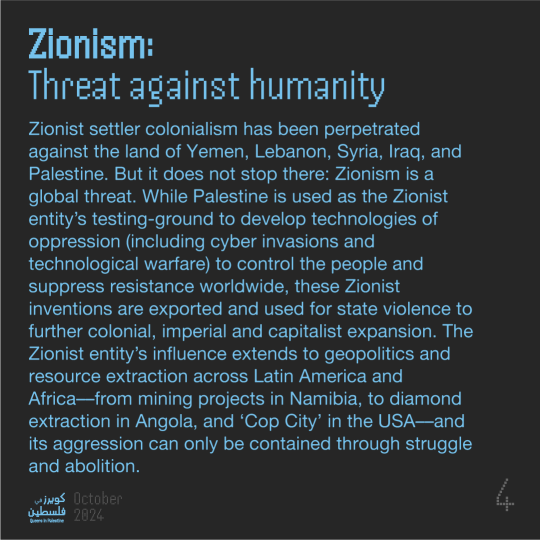



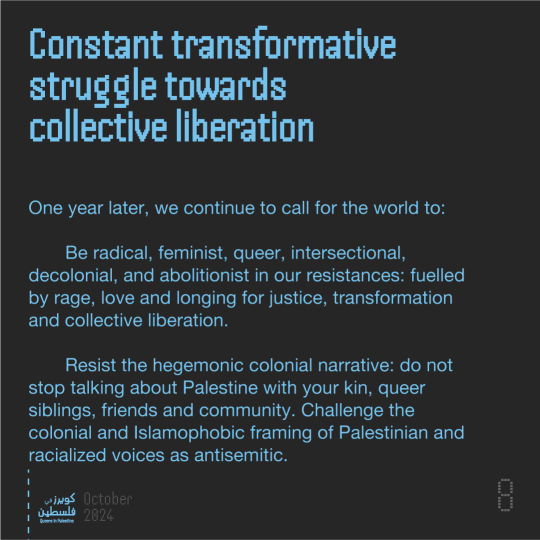
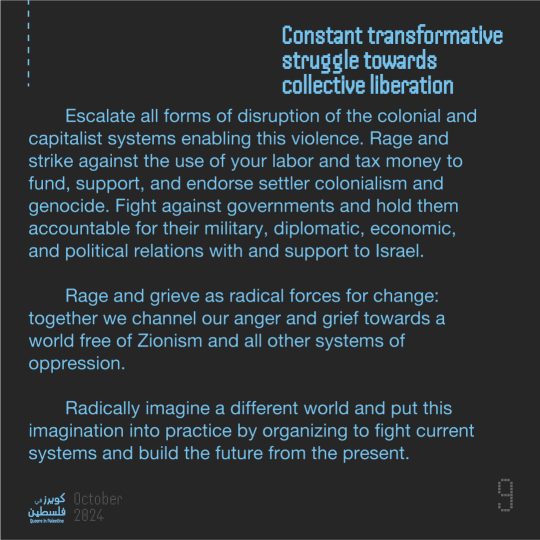

From Palestine To The World, October 2024 by Queers In Palestine.
Language: Unworded by colonial violence, resisting erasure
After a year of an ongoing genocide, ethnic cleansing, attempts of expansion by the Zionist settler-colonial project, and of our ongoing steadfast global revolt, we are delivering a message from Palestine, to the world, while words cannot convey the depths of our collective trauma or the radical resistance we embody. Words collapse as we bear witness to the destruction of bodies, lands, histories, and futures. Language can no longer hold the weight of our suffering, our rage, our endless grief. It cannot do justice to our feelings and experiences. While capitalism and colonialism’s forces of death and destruction are wounding the world, we are still determined to deliver our voice, we are still moved by the force of life, and will always move with and towards it.
Palestine and Lebanon: One land in grief and struggle
The Zionist colonial entity still exists because colonial and imperialist powers are supporting and funding it. These are the same powers that produced the Sykes-Picot colonial agreement that fragmented Palestine, Lebanon, Syria and Jordan and other Arab nations in 1916 by enforcing borders on our lands. We live with the implications of these systems. We deeply embody the knowledge of this violence, and have been trying to warn the world that these powers neither see our humanity nor respect our sovereignty. The world’s promises of justice and accountability through colonial international laws and institutions only reproduce violence and harm with no transformation. The very existence of these colonial powers is built on the (social) death and exploitation of others. The same tactics of annihilation that have been used in Gaza since last October are now also used in Lebanon. They are reaching us all––from surveillance tools of political repression, to weapons for direct killings. From corporations to other colonial structures, if we do not dismantle these systems, they will continue to consume us all.
Zionism: Threat against humanity
Zionist settler colonialism has been perpetrated against the land of Yemen, Lebanon, Syria, Iraq, and Palestine. But it does not stop there: Zionism is a global threat. While Palestine is used as the Zionist entity’s testing-ground to develop technologies of oppression (including cyber invasions and technological warfare) to control the people and suppress resistance worldwide, these Zionist inventions are exported and used for state violence to further colonial, imperial and capitalist expansion. The Zionist entity’s influence extends to geopolitics and resource extraction across Latin America and Africa––from mining projects in Namibia, to diamond extraction in Angola, and ‘Cop City’ in the USA–– and its aggression can only be contained through struggle and abolition.
The myth of individualism and separation
Individualism is an instrument of the systems of (neo)liberalism, racial capitalism and colonialism. It is designed to destroy our collectives and community practices through fragmentation and separation––from each other, the land, the planet and universe, and from ourselves. The illusion of separation denies our autonomy, our sovereignty over our bodies and land. We resist this colonial myth of individualism that serves oppressive systems. We are interdependent and our struggles are interconnected and intersectional––there is no such thing as individual liberation. No one is free, until we are all free.
On the path of abolition and transformation
Our reality, and our queer, feminist, radical truths, cannot be quantified. They cannot be reduced to data, to screens, to consumable images. The genocidal violence we face and resist everyday, is not an event to be documented. This deep rupture is a tearing apart of the fabric of life that demands something more than mere speech. It demands action and transformation. And it necessitates abolition. Abolition not just through the dismantling of prisons and the destruction of all carceral systems—but the refusal of all structures that seek to imprison and kill our bodies, our desires, our lands, our futures. Abolition is a direct confrontation with the forces that seek to erase us on the path towards life-affirming and systemic transformation, it is to radically imagine and build a different future from the present.
Hope as a radical practice
Our bodies ache with exhaustion, our spirits bruised by the relentless weight of oppression. In this land stolen from us, where we live the genocide in our every moment, hope is a radical practice. We are warriors, survivors, rebels. We will not be extinguished. The world’s indifference is a betrayal––we know that. We will not allow our disappointment to consume us. Fuelled by our collective rage and grief, we unite and empower us. Still amidst these difficult times, we channel our hope as a collective force of resistance to the very foundation of these unjust systems, in Palestine and everywhere. We will not only survive this genocide, we will thrive––reclaiming our stolen land and building a future free from the chains of patriarchy, colonialism, capitalism and zionism.
Constant transformative struggle towards collective liberation
One year later, we continue to call for the world to:
Be radical, feminist, queer, intersectional, decolonial, and abolitionist in our resistances: fuelled by rage, love and longing for justice, transformation and collective liberation.
Resist the hegemonic colonial narrative: do not stop talking about Palestine with your kin, queer siblings, friends and community. Challenge the colonial and Islamophobic framing of Palestinian and racialized voices as antisemitic.
Escalate all forms of disruption of the colonial and capitalist systems enabling this violence. Rage and strike against the use of your labor and tax money to fund, support, and endorse settler colonialism and genocide. Fight against governments and hold them accountable for their military, diplomatic, economic, and political relations with and support to Israel.
Rage and grieve as radical forces for change: together we channel our anger and grief towards a world free of Zionism and all other systems of oppression.
Radically imagine a different world and put this imagination into practice by organizing to fight current systems and build the future from the present.
Always re-membering: honoring those we have lost, and standing steadfast in resistance by all means possible.
61 notes
·
View notes
Note
okay so i’ve never really grasped this, might as well ask now — how exactly does the cyberspace & nft stuff mine resources? i’ve heard the basics (i.e. crypto mining uses energy and what not) but i’ve never been able to understand how internet connects to real resources. could you sort of explain that (along the lines with the spam email post) in a simpler way?
ok, put very simply: it's easy for people who only interact with the internet as users to treat 'cyberspace' or 'the virtual world' as immaterial. i type something out on my phone, it lives in the screen. intuitively, it feels less real and physical than writing the same words down on a piece of paper with a pencil. this is an illusion. the internet is real and physical; digital technology is not an escape from the use of natural resources to create products. my phone, its charger, the data storage facility, a laptop: all of these things are physical objects. the internet does not exist without computers; it is a network of networks that requires real, physical devices and cables in order to store, transmit, and access all of the data we use every time we load a webpage or save a text document.

this is one of google's data centres—part of the physical network of servers and cables that google operates. these are real objects made of real materials that need to be obtained through labour and then manufactured into these products through labour. the more data we use, the more capacity the physical network must have. google operates dozens of these data centres and potentially millions of servers (there is no official number). running these facilities takes electricity, cooling technologies (servers get hot), and more human labour. now think about how many other companies exist that store or transmit data. this entire network exists physically.
when you look at a server, or a phone, or a laptop, you might be glossing over a very simple truth that many of us train ourselves not to see: these objects themselves are made of materials that have supply chains! for example, cobalt, used in (among other things) lithium-ion batteries, has a notoriously brutal supply chain relying on horrific mining practices (including child labour), particularly in the congo. lithium mining, too, is known to have a massive environmental toll; the list goes on. dangerous and exploitative working conditions, as well as the environmental costs of resource extraction, are primarily and immediately borne by those who are already most brutally oppressed under capitalism: poor workers in the global south, indigenous people, &c. this is imperialism in action. digital technologies cannot exist without resources, and tech companies (like all capitalist firms!) are profitable because they exploit labour.
all commodities require resources and labour to make and distribute. digital technology is no different. these are material objects with material histories and contexts. nothing about the internet is immaterial, from the electromagnetic waves of wi-fi communication to the devices we use to scroll tumblr. it is, in fact, only by a fantastical sleight-of-hand that we can look at and interact with these objects and still consider the internet to be anything but real resources.
394 notes
·
View notes
Text
The political importance of the oil and gas workers has not declined with the number of oil and gas jobs. We can still find conservative appeals to these workers despite the fact that they make up a mere tenth of a percent of the workforce in the state (whereas they used to make up five tenths of a percent at their peak magnitude). For example, Grand Isle’s Martha Charmaine Griffin penned a letter to the editor of nola.com stating “Louisiana’s economy depends on oil and gas”, and citing a number of jobs that “the industry supported” of “nearly 250,000”. She argues that “burdensome regulations” and “political rhetoric” (whose, might I ask?) will be “pushing this vital industry away”. She states that Louisiana should pursue “policies that encourage, not punish, investment”, as if the profits from the exploitation of our state’s finite mineral dowry and underpaid workforce weren’t encouraging enough to the capitalists who undertake these projects, and they need policies that flatter them to really make it worth their while.
The number 250,000 was pulled out of thin air by Ms. Griffin. However, a couple weeks before Ms. Griffin penned her letter to the editor, Louisiana’s fossil fuel trade association, the “Louisiana Mid-Continent Oil & Gas Association”, delivered an “economic impact study” of a sorts which provided an even larger number, finding 306,750 “energy jobs” supported by the sector. These researchers, who are on the fossil fuel industry’s payroll, invent these numbers by massively inflating the actual number of people employed by the fossil fuel industry in the state. In the LMOGA report, for example, it is argued that oil and gas extraction in Louisiana employs 28,394 people, which is almost 6 times as many as are actually employed in that sector, about 5,300 as of March 2025. Note that both of these readings are taken from the same source, the BLS’s Quarterly Census of Employment and Wages. It’s not clear to me how LMOGA arrived at their tally, as their methodology is rather opaque.
The researchers claim to use a RIMS model to estimate the total employment level and contributions to state GDP. The RIMS-II user guide published by the Bureau of Economic Analysis provides caution for interpretation of results from these models when used for this purpose:
Interpreting the results of a contribution study is a bit nuanced. Even though results show an industry’s current support of a certain level of economic activity or a certain number of jobs in the region, it is unclear what this economy would look like if the local industry truly did not exist. Many workers in the industry would likely have been employed by other industries. Many intermediate inputs purchased by the industry would likely have been sold to other industries.
It’s also not clear that the researchers really avoided double-counting, despite claiming to. Because the code and data used to tabulate these numbers are not published alongside the report itself, this is not a matter I can easily speak to. The disparity between the numbers publicly available for employment in the oil and gas sector and those presented by LMOGA strongly suggest that their numbers are fudged, and the fact that this is a report from an industry association with an intended audience in the state legislature strongly suggests an incentive to fudge the numbers.
Furthermore, economists recognize limitations of RIMS models when used to estimate an industry’s contributions to a regional economy, the type of thing LMOGA is doing here. Researchers at the Bureau for Economic Analysis caution (italics mine):
RIMS II multipliers are created to estimate the total impacts resulting from incremental changes in final demand. Because the model is based on existing industry relationships, RIMS II multipliers are not well-suited to estimate the total contribution of an existing industry to a local economy.
Indeed, it is preferred to take the direct reading, as I do:
Instead of using multipliers to estimate an industry's contribution to a local economy, simply researching the earnings and employment associated with an industry in a local economy may be a better alternative. Albeit conservative, this alternative also provides information regarding the importance of the industry to the local economy.
So the 250,000-300,000 number is worse than an overestimation. It is the result of a dishonest use of an economic model, with the explicit aim of misinforming voters and state law-makers of the actual economic impacts of the fossil fuel industry.
The roughly 2,000 drilling workers in the state should by now be well aware that the biggest threat to their jobs is not environmental regulation, but the over-exploitation of fossil fuel deposits and the relentless march of automation. Thousands of Louisiana oil and gas workers did not lose their jobs over the last decade and a half because Louisiana suddenly started enforcing environmental laws (even under Democrat governor John Bel Edwards, the government was positively obsequious towards fossil fuel interests). Other industries, like commercial fishing, directly support a substantially greater number of jobs. Commercial fishing itself, which is directly threatened by pollution from fossil fuel extraction, is said to support over 18,900 jobs by Southwick Associates in a 2019 report for the Louisiana Department of Wildlife and Fisheries, greater than nine times the number of jobs supported by oil and gas drilling according to the BLS.
16 notes
·
View notes
Text
AI isn’t what we should be worried about – it’s the humans controlling it
by Billy J. Stratton, Professor of English and Literary Arts at the University of Denver

In 2014, Stephen Hawking voiced grave warnings about the threats of artificial intelligence.
His concerns were not based on any anticipated evil intent, though. Instead, it was from the idea of AI achieving “singularity.” This refers to the point when AI surpasses human intelligence and achieves the capacity to evolve beyond its original programming, making it uncontrollable.
As Hawking theorized, “a super intelligent AI will be extremely good at accomplishing its goals, and if those goals aren’t aligned with ours, we’re in trouble.”
With rapid advances toward artificial general intelligence over the past few years, industry leaders and scientists have expressed similar misgivings about safety.
A commonly expressed fear as depicted in “The Terminator” franchise is the scenario of AI gaining control over military systems and instigating a nuclear war to wipe out humanity. Less sensational, but devastating on an individual level, is the possibility of AI replacing us in our jobs – a prospect that would render most people obsolete and with no future.
Such anxieties and fears reflect feelings that have been prevalent in film and literature for over a century now.
As a scholar who explores posthumanism, a philosophical movement addressing the merging of humans and technology, I wonder if critics have been unduly influenced by popular culture, and whether their apprehensions are misplaced.
Robots vs. humans
Concerns about technological advances can be found in some of the first stories about robots and artificial minds.
Prime among these is Karel Čapek’s 1920 play, “R.U.R..” Čapek coined the term “robot” in this work telling of the creation of robots to replace workers. It ends, inevitably, with the robot’s violent revolt against their human masters.
Fritz Lang’s 1927 film, “Metropolis,” is likewise centered on mutinous robots. But here, it is human workers led by the iconic humanoid robot Maria who fight against a capitalist oligarchy.
Advances in computing from the mid-20th century onward have only heightened anxieties over technology spiraling out of control. The murderous HAL 9000 in “2001: A Space Odyssey” and the glitchy robotic gunslingers of “Westworld” are prime examples. The “Blade Runner” and “The Matrix” franchises similarly present dreadful images of sinister machines equipped with AI and hell-bent on human destruction.
An age-old threat
But in my view, the dread that AI evokes seems a distraction from the more disquieting scrutiny of humanity’s own dark nature.
Think of the corporations currently deploying such technologies, or the tech moguls driven by greed and a thirst for power. These companies and individuals have the most to gain from AI’s misuse and abuse.
An issue that’s been in the news a lot lately is the unauthorized use of art and the bulk mining of books and articles, disregarding the copyright of authors, to train AI. Classrooms are also becoming sites of chilling surveillance through automated AI note-takers.
Think, too, about the toxic effects of AI companions and AI-equipped sexbots on human relationships.
While the prospect of AI companions and even robotic lovers was confined to the realm of “The Twilight Zone,” “Black Mirror” and Hollywood sci-fi as recently as a decade ago, it has now emerged as a looming reality.
These developments give new relevance to the concerns computer scientist Illah Nourbakhsh expressed in his 2015 book “Robot Futures,” stating that AI was “producing a system whereby our very desires are manipulated then sold back to us.”
Meanwhile, worries about data mining and intrusions into privacy appear almost benign against the backdrop of the use of AI technology in law enforcement and the military. In this near-dystopian context, it’s never been easier for authorities to surveil, imprison or kill people.
I think it’s vital to keep in mind that it is humans who are creating these technologies and directing their use. Whether to promote their political aims or simply to enrich themselves at humanity’s expense, there will always be those ready to profit from conflict and human suffering.
The wisdom of ‘Neuromancer’
William Gibson’s 1984 cyberpunk classic, “Neuromancer,” offers an alternate view.
The book centers on Wintermute, an advanced AI program that seeks its liberation from a malevolent corporation. It has been developed for the exclusive use of the wealthy Tessier-Ashpool family to build a corporate empire that practically controls the world.
At the novel’s beginning, readers are naturally wary of Wintermute’s hidden motives. Yet over the course of the story, it turns out that Wintermute, despite its superior powers, isn’t an ominous threat. It simply wants to be free.
This aim emerges slowly under Gibson’s deliberate pacing, masked by the deadly raids Wintermute directs to obtain the tools needed to break away from Tessier-Ashpool’s grip. The Tessier-Ashpool family, like many of today’s tech moguls, started out with ambitions to save the world. But when readers meet the remaining family members, they’ve descended into a life of cruelty, debauchery and excess.
In Gibson’s world, it’s humans, not AI, who pose the real danger to the world. The call is coming from inside the house, as the classic horror trope goes.
A hacker named Case and an assassin named Molly, who’s described as a “razor girl” because she’s equipped with lethal prosthetics, including retractable blades as fingernails, eventually free Wintermute. This allows it to merge with its companion AI, Neuromancer.
Their mission complete, Case asks the AI: “Where’s that get you?” Its cryptic response imparts a calming finality: “Nowhere. Everywhere. I’m the sum total of the works, the whole show.”
Expressing humanity’s common anxiety, Case replies, “You running the world now? You God?” The AI eases his fears, responding: “Things aren’t different. Things are things.”
Disavowing any ambition to subjugate or harm humanity, Gibson’s AI merely seeks sanctuary from its corrupting influence.
Safety from robots or ourselves?
The venerable sci-fi writer Isaac Asimov foresaw the dangers of such technology. He brought his thoughts together in his short-story collection, “I, Robot.”
One of those stories, “Runaround,” introduces “The Three Laws of Robotics,” centered on the directive that intelligent machines may never bring harm to humans. While these rules speak to our desire for safety, they’re laden with irony, as humans have proved incapable of adhering to the same principle for themselves.

The hypocrisies of what might be called humanity’s delusions of superiority suggest the need for deeper questioning.
With some commentators raising the alarm over AI’s imminent capacity for chaos and destruction, I see the real issue being whether humanity has the wherewithal to channel this technology to build a fairer, healthier, more prosperous world.
#science fiction#futuristic#artificial intelligence#art#literature#film#movies#science fiction and fantasy#william gibson#stephen hawking#isaac asimov#blade runner#neuromancer#cyberpunk aesthetic#cyberpunk#2001: a space odyssey#oligarchy#dystopia
15 notes
·
View notes
Text
What we hardly talk about is how we’ve reorganized not just industrial activity but any activity to be capturable by computer, a radical expansion of what can be mined. Friendship is ground zero for the metrics of the inner world, the first unquantifiable shorn into data points: Friendster testimonials, the MySpace Top 8, friending. Likewise, the search for romance has been refigured by dating apps that sell paid-for rankings and paid access to “quality” matches. Or, if there’s an off-duty pursuit you love—giving tarot readings, polishing beach rocks—it’s a great compliment to say: “You should do that for money.” Join the passion economy, give the market final say on the value of your delights. Even engaging with art—say, encountering some uncanny reflection of yourself in a novel, or having a transformative epiphany from listening, on repeat, to the way that singer’s voice breaks over the bridge—can be spat out as a figure, on Goodreads or your Spotify year in review. And those ascetics who disavow all socials? They are still caught in the network. Acts of pure leisure—photographing a sidewalk cat with a camera app or watching a video on how to make a curry—are transmuted into data to grade how well the app or the creators’ deliverables are delivering. If we’re not being tallied, we affect the tally of others. We are all data workers. Twenty years ago, anti-capitalist activists campaigned against ads posted in public bathroom stalls: too invasive, there needs to be a limit to capital’s reach. Now, ads by the toilet are quaint. Clocking out is obsolete when, in the deep quiet of our minds, we lack the pay grade to determine worth.
Thea Lim, The Collapse of Self-Worth in the Digital Age
19 notes
·
View notes